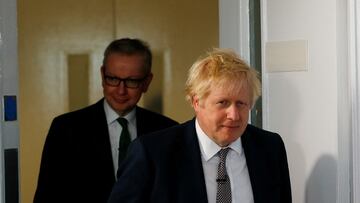Can Queen Elizabeth II force Boris Johnson to resign? Has a king or queen ever done it?
The UK Prime Minister is facing calls to resign from key members of his own party, but he is showing no sign of resigning as his critics circle.


UK Prime Minster Boris Johnson is thought to be teetering on the brink after a raft of prominent members of his own party have called for him to leave in the aftermath of the Chris Pincher MP scandal.
Since Tuesday evening more than 20 members of Johnson’s own government have resigned from their posts, including the key figures of former Chancellor Rishi Sunak and former Health Minister Sajid Javid.
New: Further Cabinet resignations will follow if Boris Johnson ignores a request by Conservative party grandees to resign, per three people familiar
— Alex Wickham (@alexwickham) July 6, 2022
Gove, Coffey tipped to go if PM won't fall on swordhttps://t.co/dxb6484AEM pic.twitter.com/aX0ZzrMOJg
Johnson is expected to face a vote of no confidence later today, which he will likely lose. But if he refuses to step down, could the 96-year-old British monarch intervene?
Can the Queen make Boris Johnson resign?
In the United Kingdom, the monarch retains all the powers as head of state but this extraordinary influence is hardly ever exercised. In the 21st century the Queen’s role in governing the UK is almost entirely ceremonial and she must be seen to remain politically neutral at all times.
However the government of the day, of which Boris Johnson is currently the leader, serves at Her Majesty’s pleasure, meaning that constitutionally she does retain ultimate control of its leadership.
When a new Prime Minster is elected, for example, they meet with the Queen to ceremonially request her permission to form a new government in her name.
Vernon Bogdanor, professor of government at King’s College London, explains: “She’s got quite wide legal powers but in a constitutional monarchy she shouldn’t use them except in very extreme circumstances.”
“During her reign she has acted throughout on the advice of her prime minister and it has proved a good rule. If parliament is unhappy with anything, it is for parliament to take the relevant actions.”
The only real reason for the Queen to intervene would be if the PM were to disregard a formal vote of no confidence, as Johnson is expected to face tonight. If he attempts to cling on to power after losing, the UK could be flung into constitutional crisis unlike anything in recent history.
Has a monarch ever removed a Prime Minister before?
While the modern day monarch has little influence on the government, this was not always the case. Having said that, it is incredibly rare for a British monarch to sack the PM.
Related stories
The most recent example comes from 1834 when King William IV dismissed Lord Melbourne, whose contemporary Whig government was considered to be dangerously extreme in its views and could pose a threat to the monarchy itself.
In that instance, the King instructed Sir Robert Peel to form a new government, but his unusual route to power meant that he had few allies in parliament and struggled to pass legislation. The King was forced to make an embarrassing U-turn in 1835 and reinstate Lord Melbourne as PM.
